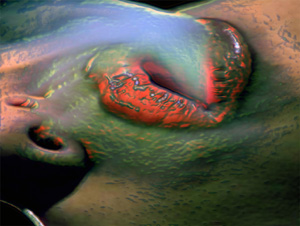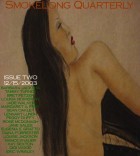How has editing Flashquake affected your writing?
I love the reading and editing parts of this business, especially the stories that are almost – but not quite – “there.” I learn so much from trying to figure out what they need to get to the YES pile.
How do you feel about flash versus other literary forms?
Flash is great for people with limited time for reading and writing. I get the feeling some don’t take it seriously – “Gosh, that’s so short, so of course it’s not a real story.” The writer must suggest far more than there’s room to spell out, which is challenging. Writing flash forces me to be more economical and subtle with words, phrases, and gestures. I like, too, that it’s easier to finish a piece and send it out.
Have any books that you love so much you just have to give them away to people?
I urge friends – and even strangers in bookstores! – to read George R.R. Martin’s A Song of Ice and Fire series – they’re some of the best books I’ve ever read. I also force people to read Connie Willis’s brilliant To Say Nothing of the Dog and Jon Hassler’s Staggerford. And The Journals of John Cheever, which are heartbreaking, and just as compelling as his stories.
What inspired this piece?
I wrote this long ago, thinking it would be a scene in something longer. I found it again after I discovered flash, and realized that the reason I hadn’t done anything with it was that it was already complete. The husband in the story is not my husband, thank God… but I have known people who build themselves up by putting others down, and often my characters seem to put themselves at the mercy of such people.
You’re vying for Miss America. What do you say in your world peace speech?
I’d like to thank my agent… oh wait, that’s my Oscar speech.
Recently I read a piece in The New Yorker about suicides on the Golden Gate Bridge. One of the stories was of a man who’d jumped to his death, leaving in his apartment a note that said something like, “If one person smiles at me on the way, I won’t jump.” That haunts me – the impact of a single smile, a seemingly insignificant gesture of kindness. I believe that big changes begin at the smallest, simplest level, and that if everyone kicked up the “nice” just one notch, we’d all be a lot happier. (Stay tuned for the talent competition, where I’ll twirl a baton to “You’re Never Fully Dressed Without a Smile.”)
You used to work for Wizards of the Coast. So what are your personal stats for Strength, Intelligence, etc?
I was more involved with Magic: The Gathering than with D&D, so I’ll tell you instead what my personal deck might look like. I’d describe it as a Prismatic Highlander Peasant deck – a huge, impossible deck featuring all five colors, mostly common cards, and no more than one of each non-land card. Would it be effective against competitive decks? No way, but it would be fun. I’d enjoy the variety, and the thrill of not knowing what card I would draw next.



 The core workshop of SmokeLong Fitness is all in writing, so you can take part from anywhere at anytime. We are excited about creating a supportive, consistent and structured environment for flash writers to work on their craft in a community. We are thrilled and proud to say that our workshop participants have won, placed, or been listed in every major flash competition. Community works.
The core workshop of SmokeLong Fitness is all in writing, so you can take part from anywhere at anytime. We are excited about creating a supportive, consistent and structured environment for flash writers to work on their craft in a community. We are thrilled and proud to say that our workshop participants have won, placed, or been listed in every major flash competition. Community works.